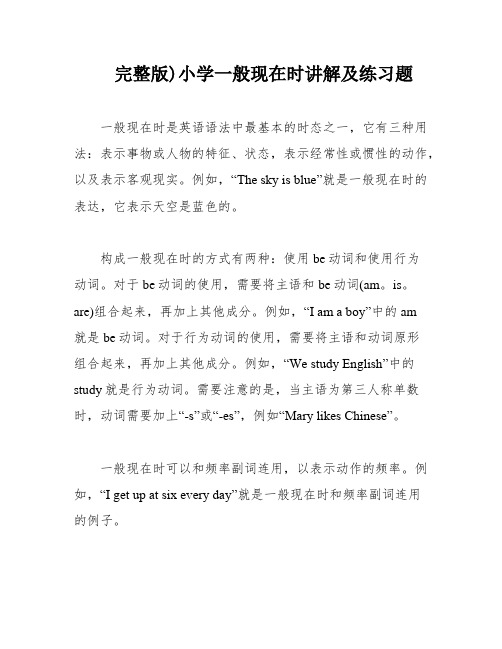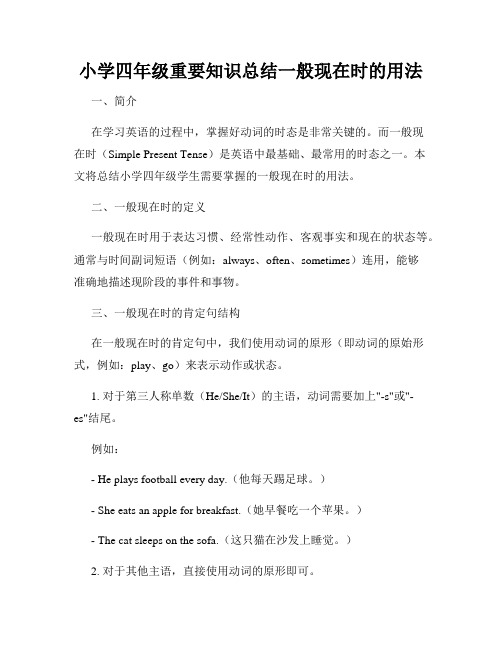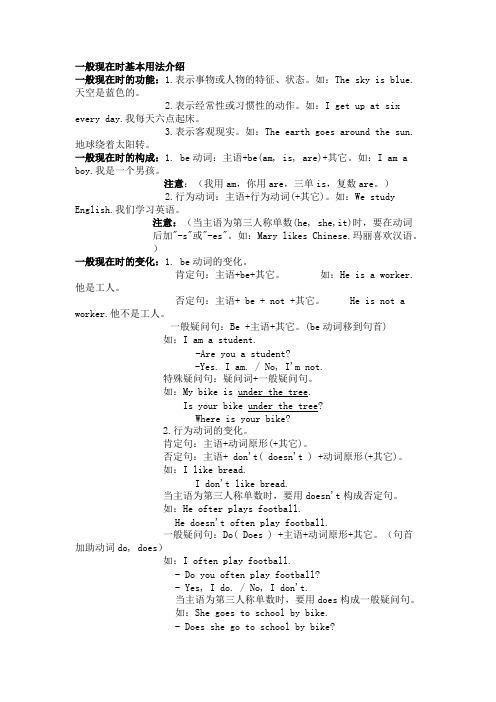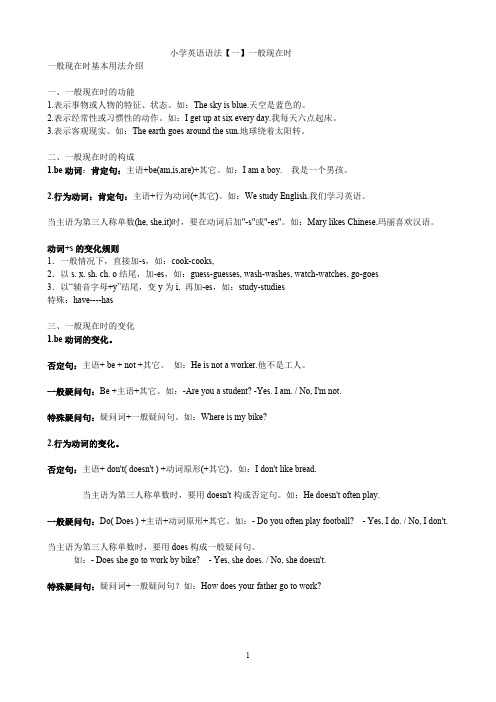小学一般现在时(详细讲解)
完整版)小学一般现在时讲解及练习题

完整版)小学一般现在时讲解及练习题一般现在时是英语语法中最基本的时态之一,它有三种用法:表示事物或人物的特征、状态,表示经常性或惯性的动作,以及表示客观现实。
例如,“The sky is blue”就是一般现在时的表达,它表示天空是蓝色的。
构成一般现在时的方式有两种:使用be动词和使用行为动词。
对于be动词的使用,需要将主语和be动词(am。
is。
are)组合起来,再加上其他成分。
例如,“I am a boy”中的am就是be动词。
对于行为动词的使用,需要将主语和动词原形组合起来,再加上其他成分。
例如,“We study English”中的study就是行为动词。
需要注意的是,当主语为第三人称单数时,动词需要加上“-s”或“-es”,例如“Mary likes Chinese”。
一般现在时可以和频率副词连用,以表示动作的频率。
例如,“I get up at six every day”就是一般现在时和频率副词连用的例子。
一般现在时还可以用于构成否定句、一般疑问句和特殊疑问句。
对于be动词的否定句,需要在be动词后面加上not。
例如,“He is not a worker”就是be动词的否定句。
对于行为动词的否定句,需要在主语和动词原形之间加上don't或doesn't。
例如,“I don't like bread”和“He doesn't often play”就是行为动词的否定句。
对于一般疑问句,需要将be动词或do/does放在主语前面。
例如,“Are you a student?”就是一般疑问句。
对于特殊疑问句,需要在疑问词后面加上一般疑问句。
例如,“Where is my bike?”就是特殊疑问句。
需要注意的是,当主语为第三人称单数时,否定句和一般疑问句需要用doesn't,而不是don't或do。
例如,“He doesn't often play”和“Does she go to work by bike?”就是主语为第三人称单数时的否定句和一般疑问句。
小学一般现在时详细讲解

Does Mr. Green come from Shanghai? Millie doesn’t live in a flat in Beijing.
• 3. Daniel enjoys playing computer games.
否定句的构成 主语 + be + not + 其他
is not = isn’t am not= ’m not are not= aren’t
• 1、Kitty isn’t (not) an English girl. • 2、Wearen’t (not) students. • 3、I am not (not) from Taizhou. • 4、She isn’t (not) tall. • 5、Lucy and Lily aren’t (not)good friends. • 6、Those chairs aren’t (not) broken. • 7、The bagisn’t (not) mine
一般现在时(关键词)
➢现在 ➢经常反复发生 ➢习惯性 ➢规律、真理
1.表示现在的状态: e.g. He’s twelve.
She’s at work.
2.表经常、反复、习惯性的动作: e.g. I get up at 6:30 every day.
He reads English every morning.
一般现在时的构成
一、系动词be的一般现在时
1、构成: 主语 + be + 其他
The girl is my friend.
2、be 包 括 哪 些 ?
小学英语语法一般现在时详细讲解

主语(I/We/You/They)+ do+not+动词原形+其他
如:I don’t stay at home on Saturdays. They don’t have sports every day.
主语(He/She/It)+ does+not+动词原形+其他
特殊疑问句: 疑问词+一般疑问句? 直接回答,而不用yes 或no.
5.一般现在时的句型变换 1) I usually play football on Friday. 改为一般疑问句: Do you usually play football on Friday? 对划线部分提问: What do you usually do on Friday? 2) My father go to work by bike everyday. 对划线部分提问: How does your father go to work everyday?
3. 表示永恒不变的真理;
The moon goes round the earth.
一. be动词的一般现在时
be动词: 主语 + be +其它
如:I am a boy. 我是一个男孩。问句:
4) 特殊疑问句: 疑问词+ do/does+主语+动词原形+其他? 如: What do you want? What does she want? What time do you have lunch? What time does she have lunch? What do you do? What does she do? How do you spell it? How does he spell it?
小学四年级重要知识总结一般现在时的用法

小学四年级重要知识总结一般现在时的用法一、简介在学习英语的过程中,掌握好动词的时态是非常关键的。
而一般现在时(Simple Present Tense)是英语中最基础、最常用的时态之一。
本文将总结小学四年级学生需要掌握的一般现在时的用法。
二、一般现在时的定义一般现在时用于表达习惯、经常性动作、客观事实和现在的状态等。
通常与时间副词短语(例如:always、often、sometimes)连用,能够准确地描述现阶段的事件和事物。
三、一般现在时的肯定句结构在一般现在时的肯定句中,我们使用动词的原形(即动词的原始形式,例如:play、go)来表示动作或状态。
1. 对于第三人称单数(He/She/It)的主语,动词需要加上"-s"或"-es"结尾。
例如:- He plays football every day.(他每天踢足球。
)- She eats an apple for breakfast.(她早餐吃一个苹果。
)- The cat sleeps on the sofa.(这只猫在沙发上睡觉。
)2. 对于其他主语,直接使用动词的原形即可。
例如:- I like ice cream.(我喜欢冰淇淋。
)- We go to school by bus.(我们坐公交车上学。
)- They study English on weekends.(他们周末学英语。
)四、一般现在时的否定句结构在一般现在时的否定句中,我们在助动词"Do/Does"后面加上"not",并使用动词的原形来表示否定的动作或状态。
1. 对于第三人称单数(He/She/It)的主语,助动词"Do"变为"Does",动词不再需要变化。
例如:- He does not play football every day.(他不每天踢足球。
(完整)小学阶段的一般现在时

一般现在时基本用法介绍一般现在时的功能:1.表示事物或人物的特征、状态。
如:The sky is blue.天空是蓝色的。
2.表示经常性或习惯性的动作。
如:I get up at six every day.我每天六点起床。
3.表示客观现实。
如:The earth goes around the sun.地球绕着太阳转。
一般现在时的构成:1. be动词:主语+be(am, is, are)+其它。
如:I am a boy.我是一个男孩。
注意:(我用am,你用are,三单is,复数are。
) 2.行为动词:主语+行为动词(+其它)。
如:We study English.我们学习英语。
注意:(当主语为第三人称单数(he, she,it)时,要在动词后加"-s"或"-es"。
如:Mary likes Chinese.玛丽喜欢汉语。
)一般现在时的变化:1. be动词的变化。
肯定句:主语+be+其它。
如:He is a worker. 他是工人。
否定句:主语+ be + not +其它。
He is not a worker.他不是工人。
一般疑问句:Be +主语+其它。
(be动词移到句首)如:I am a student.-Are you a student? -Yes. I am. / No, I'm not.特殊疑问句:疑问词+一般疑问句。
如:My bike is under the tree.Is your bike under the tree?Where is your bike?2.行为动词的变化。
肯定句:主语+动词原形(+其它)。
否定句:主语+ don't( doesn't ) +动词原形(+其它)。
如:I like bread. I don't like bread.当主语为第三人称单数时,要用doesn't构成否定句。
(完整版)小学英语时态讲解及练习(最新整理)

小学英语语法【一】一般现在时一般现在时基本用法介绍一、一般现在时的功能1.表示事物或人物的特征、状态。
如:The sky is blue.天空是蓝色的。
2.表示经常性或习惯性的动作。
如:I get up at six every day.我每天六点起床。
3.表示客观现实。
如:The earth goes around the sun.地球绕着太阳转。
二、一般现在时的构成1.be动词:肯定句:主语+be(am,is,are)+其它。
如:I am a boy. 我是一个男孩。
2.行为动词:肯定句:主语+行为动词(+其它)。
如:We study English.我们学习英语。
当主语为第三人称单数(he, she,it)时,要在动词后加"-s"或"-es"。
如:Mary likes Chinese.玛丽喜欢汉语。
动词+s的变化规则1.一般情况下,直接加-s,如:cook-cooks,2.以s. x. sh. ch. o结尾,加-es,如:guess-guesses, wash-washes, watch-watches, go-goes3.以“辅音字母+y”结尾,变y为i, 再加-es,如:study-studies特殊:have----has三、一般现在时的变化1.be动词的变化。
否定句:主语+ be + not +其它。
如:He is not a worker.他不是工人。
一般疑问句:Be +主语+其它。
如:-Are you a student? -Yes. I am. / No, I'm not.特殊疑问句:疑问词+一般疑问句。
如:Where is my bike?2.行为动词的变化。
否定句:主语+ don't( doesn't ) +动词原形(+其它)。
如:I don't like bread. 当主语为第三人称单数时,要用doesn't构成否定句。
小学英语语法时态讲解与归纳一般现在时
小学英语语法时态讲解与归纳—一般现在时一.意义: 表示经常发生的事情;动作或存在的状态二.构成及变化1.be动词的变化..肯定句:主语+beam;is;are+其它..如:.a..boy.我是一个男孩..否定句:主语.b..no.+其它..如:H.i.no..worker.他不是工人..一般疑问句:B.+主语+其它.. 如:-Ar.yo..studen.-Yes..am..No.I'.not.特殊疑问句:疑问词+一般疑问句..如:Wher.i.m.bik.2.行为动词的变化..l、当主语为第一;二人称及复数时;助动词为do肯定句:主语+动词原形+其它..如:W.ofte.pla.basketbal.afte.school.否定句:主语.don't+动词原形+其它..如:w.don’.pla.basketbal.afte.school.一般疑问句:D.+主语+动词原形+其.如.D.yo.ofte.pla.basketbal.afte.schoo....Yes.w.do..No.w.don't. 特殊疑问句:疑问词+以do开头的一般疑问句如.Wha.d.yo.ofte.d.afte.schoo.2、当主语为第三人称单数.;助动词为does肯定句:主语+动词三单式+其它..如.H.swim.well.否定句:主语.doesn’t+动词原形+其它..如:H.doesn’.swi.well..一般疑问句:Doe.+主语+动词原形+其它..如:Doe.h.swi.wel.Yes.h.does..No.h.doesn't.特殊疑问句:疑问词+以does开头的一般疑问句如.Ho.doe.you.fathe.g.t.wor.三.第三人称单数的动词变化规则只有在第三人称为主语的肯定句中;动词才用三单式1多数动词直接加s:runs gets likes collets takes playsclimbs…….2结尾是s.x.sh.ch.o;前为辅音字母;结尾加e.: watches teaches goes does washes crosses mixes brushes3动词末尾y前为辅音:将y改为i加es.study→studie.fly→flies carry→carriescry→cries但在y前如果为元音则直接加s: buys says四.时间标志:uall..ofte..sometime.;every…一般现在时练习题1I.用下列单词的适当形式填空1.We often___________play in the playground.2.He _________get up at six o’clock.3.__________you _________brush your teeth every morning4.What________________do he usually________________do after school5.Danny ________________study English; Chinese; maths; science and Art at school.6.Mike sometimes __________go to the park with his sister.7.At eight at night; she __________watch TV with his parents.8.________ Mike________read English every day9.How many lessons_________your classmates________have on Monday10.What time_________his mother_________do the houseworkII.改句子1.Do you often play football after school 改为肯定句2.I have many books.改为否定句3.Gao S han’s sister likes playing table tennis 改为否定句4.She lives in a small town near New York.改为一般疑问句5.I watch TV every day.改为一般疑问句6.We have four lessons.改为否定句7.Nancy doesn’t run fast 改为肯定句8.M.do.run.fast.................................否定句: 一般疑问句:9.Mike has two letters for him.一般疑问句:否定句: 10.I usually play football on Friday afternoon.否定句:一般疑问句:划线提问11.Su Yang usually washes some clothes on Saturday.否定句:一般疑问句:划线提问:12.Mingming usually waters the flowers every day.否定句:一般疑问句:13.Tom does his homework at home.否定句:一般疑问句:一般现在时练习题2一、用所给动词的真确形式填空1.. lik.___________.swim.2.H._________rea.Englis. ever. day.3.W._________got.schoo.a.seve.i.th.morning.4.Mike________got.schoo.a.seve.i.th.morning.5.M. mother________lik.______g.shopping.6..ca.________dra. man. beautifu. pictures.7.She_________mak.. mode. plane.8.D. yo.________like_________ru.9.Doe. he_________like_________jum.10.Doe.Nancy_________growflower.o.Saturda.11.Th. teachers________like___________dance.12.Th.teacher________like____________dance.13.Th.students___________spea.Englis.i.class.14.Th.student_________spea.Chines.afte.class.15.Let’s____________an.pla.footbal.. g.16.He____________.lik.swimmin.. no.17.I’.sorr.____________tha.. hea.18.Wan.Bin.is___________. writ. a.E-mai.t.hi.frien..19.H.has_____________.headach.. ge.20._________yo.stud.Englis.a.schoo..Ye..I___________. d.21.__________you.siste.stud.Englis.a.schoo..N..she_________.. d.22.I’.________.bette.. fee.23.Why__________To.absen.toda.. b.二、用所给的人称改写句子1..tak.photo.o.Sunday. Mike2.W.gro.beautifu.flowers.she3.The.lik.collectin.stamps.Ben4..liste.t.musi.carefully.m.aunt5.Yo.lik.makin..mode.ship.Helen6.W.clea.th.classroo.ever.day.he7.The.loo.afte.th.pandas.M.Wang8..dra..tre.an.som.flowers.Nancy9.W.g.t.be.a.eight. m.sister10..rea.newspaper.i.th.evening.M.Green。
小学生一般现在时讲解及练习题
小学生一般现在时讲解及练习题一、一般现在时的用法一般现在时表示经常性的动作、惯、事实或真理。
以下是一般现在时的用法:1. 表示经常性的动作或惯- She brushes her teeth every morning.(她每天早上刷牙。
)- They always go for a walk in the park.(他们总是去公园散步。
)2. 表示普遍真理或事实- The Earth revolves around the Sun.(地球绕着太阳转。
)- Water boils at 100 degrees Celsius.(水在100摄氏度沸腾。
)3. 表示瞬间事件或现况- I love ice cream.(我喜欢冰淇淋。
)- The dog barks loudly.(狗叫得很大声。
)二、一般现在时的构成在一般现在时中,动词的变化相对简单。
1. 对于第三人称单数(He/She/It),动词要加-s或-es。
- He walks to school every day.(他每天走路去学校。
)- She eats an apple.(她吃一个苹果。
)- It runs fast.(它跑得很快。
)2. 对于其他人称(I/You/We/They),动词不变。
- I play soccer on weekends.(我周末踢足球。
)- You read books every night.(你每晚读书。
)- We go swimming in summer.(我们夏天去游泳。
)- They watch movies together.(他们一起看电影。
)三、练题请根据句意填入正确的动词形式。
1. My mother __________ (cook) dinner for us every evening.2. Tom and Lisa __________ (play) tennis on Saturdays.3. The sun __________ (rise) in the east.4. We __________ (study) English at school.5. Dogs __________ (bark) when they see strangers.1. cooks2. play3. rises4. study5. bark希望以上讲解和练习题对你有帮助!。
小学英语语法-一般现在时详细讲解
小学英语语法-一般现在时详细讲解一般现在时是英语语法中最基础也是最常用的时态之一。
它表示的是习惯性、经常性和普遍性的行为或状态。
在本文中,我将详细介绍一般现在时的形式、用法和注意事项。
一、一般现在时的形式一般现在时的肯定句的基本结构是:主语+谓语动词+其他。
谓语动词在第三人称单数形式时要加上-s或-es。
例如:- I eat breakfast every morning.(我每天早上吃早饭。
)- She goes to school by bus.(她坐公共汽车去学校。
)否定句的结构是:主语+do not/does not+动词原形+其他。
例如:- I do not like coffee.(我不喜欢咖啡。
)- He does not play football.(他不踢足球。
)疑问句的结构是:Do/Does+主语+动词原形+其他?例如:- Do you like ice cream?(你喜欢冰淇淋吗?)- Does she go to the park every weekend?(她每个周末去公园吗?)二、一般现在时的用法第1页/共4页1. 表示习惯或经常性的动作:- I write in my diary every night.(我每天晚上写日记。
)- They play basketball every Sunday.(他们每个星期天打篮球。
)2. 表示客观事实、自然规律或科学真理:- Water boils at 100 degrees Celsius.(水在100摄氏度时煮沸。
)- The sun rises in the east.(太阳从东方升起。
)3. 表示感觉、想法和喜好:- I love chocolate.(我喜欢巧克力。
)- He hates to wake up early.(他讨厌早起。
)4. 表示现时状态或现时临时的动作:- I am a student.(我是一个学生。
小学英语语法_一般现在时详细讲解
千里之行,始于足下。
学校英语语法_一般现在时具体讲解一般现在时(Simple Present Tense)是英语中最基本的时态之一,用来表达经常性或习惯性的动作、客观事实、常规活动等。
以下是一般现在时的具体讲解。
1. 构成:主语 + 动词原形(第三人称单数要在动词后加-s)+ 其他。
例如:- I play soccer on weekends.(我周末踢足球。
)- He watches TV every evening.(他每天晚上看电视。
)2. 主语:一般现在时的主语可以是第一人称、其次人称或第三人称。
例如:- I go to school every day.(我每天去上学。
)- You like ice cream.(你宠爱冰淇淋。
)- She plays the piano well.(她弹得很好。
)3. 动词的变化:- 第三人称单数一般在动词后面加上-s或-es。
例如:he/she/itplays(he plays,she plays,it plays),he/she/it watches(he watches,she watches,it watches)。
- 一般现在时的否定形式是在动词前面加上do not(don’t)或does not(doesn’t)。
例如:I do not dance(我不跳舞),She does not like coffee(她不宠爱咖啡)。
- 一般现在时的疑问形式是把do或does放在主语前面。
例如:Do you play tennis?(你打网球吗?),Does she go to the gym?(她去健身房吗?)4. 使用场景:第1页/共2页锲而不舍,金石可镂。
- 表达经常性或习惯性的动作。
例如:I eat breakfast every morning.(我每天早上吃早餐。
)- 表达客观事实、普遍真理等。
例如:The sun rises in the east.(太阳从东方升起。
- 1、下载文档前请自行甄别文档内容的完整性,平台不提供额外的编辑、内容补充、找答案等附加服务。
- 2、"仅部分预览"的文档,不可在线预览部分如存在完整性等问题,可反馈申请退款(可完整预览的文档不适用该条件!)。
- 3、如文档侵犯您的权益,请联系客服反馈,我们会尽快为您处理(人工客服工作时间:9:00-18:30)。
1、Is this your English book ?
be 主语
其他
Yes,it is.
No,it isn’t.
be + 主语 + 其它部分?
肯定回答:Yes,主语+be
否定回答:No,主语+be+not
注意:在回答时,主语要用相应的代词代替
2020/11/17
含be一般疑问句的改写
2、以辅音字母加y结尾的动词,要先将y变为i,再加 es fly →flies carry →carries study →studies
3、以“s, x, ch, sh”结尾的,在词尾加“es”, teach-teaches [iz]; watch-watches box---
2020/11/17
He reads English every morning.
常用的状语:often , sometimes , usually , every day 等。
3.表示不受时间限制的普遍真理和自然规律: e.g. Two and four is six. The moon goes around the earth.
are •主语为复数时――→
am •主语为“I”时 ――→
2020/11/17
Exercise
•1、Kitty______an English girl.
is
•2、We ______students.
are
•3、I _a_m____ from_ tall.
2020/11/17
8
否定句的构成
主语 + 助动词(do/does)+not +动词原形 + 其他
These boys don’t(do not) like playing football.
These boys like playing football.
The girl doesn’t (does not)read English every morning.
•秘诀:一调二改三问号
一调:即把句中的be调到主语前; 二改:改换主语称谓,即将句中的主语I my mine we our ours等第一人称分别改为相应的第二人称you your yours等; 三问号:句末的句号改为问号
2020/11/17
行为动词的一般现在时
构成 主语 + 行为动词 + 其他
•5、Lucy
and
Lily
are
______
good
friends.
are
•6、Those chisairs ______broken.
•7、The bag______ mine.
2020/11/17
否定句的构成 主语 + be + not + 其他
is not = isn’t am not= ’m not are not= aren’t
一般现 在时
2020/11/17
一般现在时(关键词) ➢现在 ➢经常反复发生 ➢习惯性 ➢规律、真理
2020/11/17
1.表示现在的状态: e.g. He’s twelve.
She’s at work.
2.表经常、反复、习惯性的动作: e.g. I get up at 6:30 every day.
Complete the sentences.
1. My father_l_is_t_e_n_s_(listen) to the radio every day. 2. Mike_st_u_d_i_e_s_ (study) in a middle school. 3. She_t_a_k_e_s_(take) Eddie for a walk after supper. 4. He_w_a_s_h_e_s_(wash) clothes with his hands. 5. Simon _p_a_ss_e_s_ (pass) the ball to Daniel. 6. Miss Li_t_ea_c_h_e_s_ (teach) Chinese. 7. Look at the animal, it _h_a_s_ four legs.
2020/11/17
• 1、Kitty isn’t (not) an English girl. • 2、We aren’t (not) students. • 3、I am not (not) from Taizhou. • 4、She isn’t (not) tall. • 5、Lucy and Lily aren’t (not)good friends. • 6、Those cihsna’tirs aren’t (not) broken. •7、The bag (not) mine
usually
always
2020/11/17
3、次数
一次 once 两次 twice 三次 three times 一周两次 twice a week 每周四次 four times a week 每周六 on Saturdays 每周日 on Sundays
2020/11/17
一般现在时的构成
2020/11/17
一、系动词be的一般现在时
1、构成: 主语 + be + 其他
The girl is my friend.
2、be 包 括 哪 些 ?
is am are
3、 什么时候用is? 什么时候用am? 什么时候用are?
取决于主语是单数 还是复数
2020/11/17
•主语为单数时――→ is
2020/11/17
常与一般现在时连用的 词
2020/11/17
1、every系列
•every
2020/11/17
•day •year •month •week •morning •afternoon •evening
2、频率副词
never
seldom rarely
sometimes
often
These boys like playing football. The girl reads English every morning. 注意:当主语为第三人称单数时,
行为动词要加s或者es
什么时候加s,什么时候加es呢?
2020/11/17
1、大多数动词在词尾直接加s, read → reads look→ looks play→ plays
